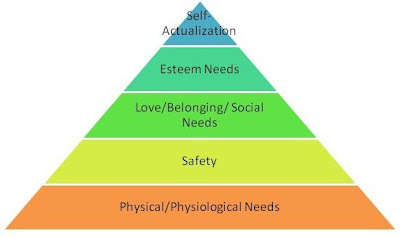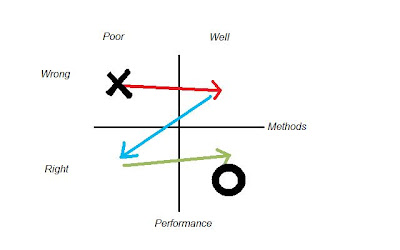Wednesday, December 23, 2009
Wednesday, November 25, 2009
Motivating Forces
The genius of the discussion was when we talked about how we motivate others. But I realize the real motivation must come from inside. Self-motivate people are, after all, the easiest ones to lead. You just share the vision and they get to work.
Perhaps you’ve heard of Maslow. He established the commonly-studied hierarchy of human needs.

We first need to meet our physical needs, then establish safety, then our social needs (belonging), then ego/esteem needs (self-respect, accomplishment) and self-actualization (explain what this is).
But what I never realized was how this directly applies to (and was created to explain) motivation factors.
We are most motivated by the needs that are NOT being met.
For example: Have you ever noticed the lengths impoverished people go to get food? Digging in the garbage can, disease or danger mean almost nothing to them. Safety definitely does not come first.
Or, say you take a poor, newlywed college-student couple and offer the Mr. or Mrs. two jobs: one offers great environment and great people, the other pays $50/hr (pays rent and buys food). Which one do you think they might choose? (Which is the need the least met?)
They’d probably choose the money for food.
But if you take a middle-aged man who has a family, a nice house, enough money in his reserve bank, what will motivate him? More money? Or safety? Or would it be more along the lines of an opportunity to accomplish something great and work with awesome people? He probably isn't as motivated by the money or safety (which are already established) as he would be the opportunity to achieve something great.
Are you catching my drift?
Maslow taught that human beings are motivated most by the needs that are not being met.
What are some of the things that motivate you? Does this same trend hold true for you?
Thursday, November 12, 2009
HOPE
I thought it was a nice story, and it was nice to find it in the headlines of CNN. A coincidence, right?
Of course, I think not. They're headlining miracles! The liberal news source is headlining miracles. But not just any miracles. They're headlining Good Samaritan miracles. Did you see the other passengers save her life? And they didn't do it for a reward. They didn't do it to be seen or to have the pride. I mean, they were just acting instinctively. Just look at them frantically waving their arms!
Last time I checked, the only thing I saw on the local news from another country was the announcement that there was another conflict in the Middle East--but in order to hit international news, it's got to be a big event. Our local coverage of the 20th anniversary of the Berlin Wall's fall was just about as long as France's coverage is this woman's narrow escape from death. (It was Monday, by the way, and it changed the world 20 years ago, just in case you didn't notice.)
What is it that makes us--as a society--shun goodness in our news stories but seek desperately to flash it across our TV screens?
Is it a hint at something more? Like maybe the divine nature we each possess? We outwardly oppose virtue but find it a coincidence that some complete strangers saved a drunk woman's life?
I don't know about you, but I know there's something more that CNN won't find a report on anywhere. And that is the goodness of human beings. And it's not just cuz our mothers told us so, but because there's something more to our existence, to our being. As God's literal children, we're something more on the inside than the news will ever be able to help us understand.
Wednesday, October 21, 2009
Collaboration: Celebrate Success
"There is no room for 'territoriality.' Who cares if you share the secrets of the trade? It is a gift that makes the world better! A secret recipe taken to the grave is a pity as it is only enjoyed by a select few and then lost!"
And in true collaborative form, I share the source of this wisdom: Kriss Jacobson, faculty adviser on campus.
I heard those words and knew there was a blog post just for you.
So what do you think about?
In class a few weeks ago, we talked about collaboration. Back in the 19080's, Ford wanted to revolutionize the world. They sat down with designers, engineers, manufacturers, assembly line workers, housewives, and a whole bunch of other people to design a new car.
The engineers questioned the validity of the housewives' comments. Who wouldn't? Housewives don't make cars. BUT they drive them.
In the end, all pride aside, they came out with the Taurus that revolutionized their company and the auto industry. It was a top seller for many years.

Beethoven, the movie, anyone? 7th Heaven?
(Thanks to wikicars.org for their courtesy image. It's all about sharing the success, right?)
So I got to thinking.
In the business world, it's all about competition, right? Sharing ideas sounds like Zion, and that's something we do at Church, right? Rightly so. Collaboration, delegation, sharing ideas--it's all based on true principle. No wonder it's what makes true companies succeed. Truth in all its forms has a way of doing that, you know.
Sister Jacobson also said, "Pull in the experts. Don't try to do something you are not experienced in. Give it to someone who can do it easier and better because they do it all the time."
If someone steals your idea, shouldn't the success of your idea be what makes you happy?
Or are we too set on being the ones to do the work (no matter how hard the task) that matters most? Or do we really, truly find success in seeing someone else make our ideas thrive (stronger than we could have), or are we stuck on being the ones with all the credit?
What do you think? And how would you respond? Or are your responses different? What's the right thing to do?
Collaboration in all its forms requires honesty and humility, but that's what life is all about: helping each other find success an return to our Heavenly Home. We can't do it alone. So why do we try so hard to do it on our own?
Share with me your thoughts. Do you see the beauty of collaboration? How have you seen it in your life? How do we overcome that natural tendency to do it all and let the glory belong to someone else?*
* (Sounds like two plans we heard long ago, huh. Click here: Moses 4:2 There are some interesting connections and implications in our life. What connections do you see?)
Please Excuse
Please excuse my creative genius for being absent from the blogging world the past two weeks. He was busy taking care of other homework and college events.
Sincerely,
The Faithful Blogger.
Saturday, October 3, 2009
Inevitable Change
 We start (X) sometimes learning a new skill. It's not the best technique, and we don't do it well, but nevertheless, we begin. Maybe we can compare it to learning how to play the piano. We get pretty good at it eventually (moving into the next quadrant). And then someone comes along to tell us our form/technique/whatever is not correct. So, we try to learn the correct technique. And, well, you just can't play the right way as well as you could the wrong way. Right?
We start (X) sometimes learning a new skill. It's not the best technique, and we don't do it well, but nevertheless, we begin. Maybe we can compare it to learning how to play the piano. We get pretty good at it eventually (moving into the next quadrant). And then someone comes along to tell us our form/technique/whatever is not correct. So, we try to learn the correct technique. And, well, you just can't play the right way as well as you could the wrong way. Right?However, we eventually make it to playing well and correctly. Mozart would be proud.
The same thing could apply to using a PC at first to using a MAC second (though I don't dispute that one is better than the other). You work your way up to being pretty good at using your PC, and then you get a MAC and have no idea how the little box is supposed to work. But you learn and grow and become MAC proficient.
It's all about moving from one level of comfort to the next level of discomfort--in order to grow.
Change is all about being stretched and rolled out. Seriously, sugar cookies taste much better when they're rolled out. And to get it right, you're going to have to roll it up in a ball and then flatten the dough again.
And bread always tasted better after being smooshed and punched so the gasses could make it grow from the inside. That's the way it's supposed to be.
But if we stay in our little square of comfort, we'll never advance to the next and, quite frankly, we'll be stuck there for a long time, missing out on some of the good and new adventures in life, right? You've got to go outside the comfort zone and experience change. Change makes us better. It's the same way in an organization, too (which is my sneak peak at my next post, by the way).
So how have you been forced to change (or stretched, or rolled out or scribbled like a pen*)? And how did you see yourself grow?
Or did you think you were chocolate chip cookie dough (that only has to be plopped on the cooking sheet) only to find out you were supposed to be the bread that started a feast?
And in what ways did the Lord use you to further His work? Or was it just to help you learn and grow, to prepare you for something great in the years to come?
Let me know how you've been molded and shaped and changed by the Lord into the new creature He wants you to be.
* The pen is another sneak peak at a future post on doing the Lord's will. It might find itself in the post on the change that must take place in our hearts.